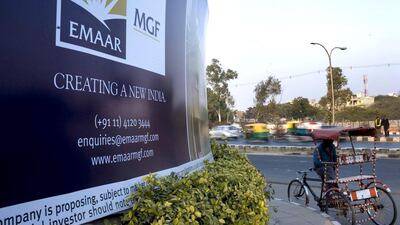Bribery and corruption in India remain major challenges to the country's economy and businesses, with companies ill-prepared to meet the demands of global anti-corruption laws and tightening local regulation, a survey reveals.
"Bribery is neither a cost-effective nor a sustainable business strategy," said Toby Latta, the Asia Pacific chief executive of Control Risks, a consultancy that compiled the international survey.
"This is a challenging world for business. Good companies may wish to comply with their countries' anti-corruption laws, but are disadvantaged by competitor companies not playing by the rules," said Mr Latta.
UAE companies have been hurt by their entanglement in graft scandals in India.
For instance, the UAE telecoms firm Etisalat was caught up in the second-generation (2G) spectrum case in India when licences were issued to companies in 2008 but were later revoked because they were allegedly sold at cut-price rates.
Etisalat had entered the Indian telecoms market in 2009 through its acquisition of a stake in Swan Telecom. Swan bought the disputed licences in 2008 prior to Etisalat's investment.
Those licences were cancelled last year as part of the corruption investigation that resulted in a Dh3 billion impairment charge for Etisalat.
The Dubai property developer Emaar also faced challenges with its joint venture in India, Emaar MGF. It was caught up in the alleged large-scale corruption scandal surrounding the development of the Commonwealth Games village in New Delhi.
The survey reveals that 62 per cent of the Indian companies interviewed did not have a formal policy statement that forbids the use of bribes to secure business. That compares with 23 per cent of United States firms and 35 per cent of global companies.
In addition, 91 per cent of Indian firms did not have specialised anti-corruption training for employees, compared with 74 per cent of global firms and 52 per cent of US companies, according to Control Risks.
Indian companies were also found to be the least likely to have whistleblowing mechanisms. Only 24 per cent had such a confidential system, while 40 per cent of global companies and 52 per cent of US firms said they had that in place.
Just 18 per cent of Indian firms indicated that they were planning to increase expenditure on anti-corruption measures. That compares to the global average of 35 per cent and a US average of 48 per cent.
"The report reveals that Indian companies surveyed … are unprepared to meet the challenges of adhering to international anti-corruption legislation, not to mention a tightening domestic regulatory framework," Control Risks said.
"Meanwhile, the risks to business of prosecution, fines and reputational damage continue to grow.
"Indian companies are most concerned about operational bribes and third-party risks, and lag behind their global peers in providing anti-corruption training to their employees, having whistleblowing mechanisms and budget dedicated to anti-corruption initiatives."
James McAlpine, the managing director for Control Risks in India, said the country still had a "long way" to go in tackling graft.
India is awaiting regulatory changes, including the Prevention of Corruption (Amendment) Act, which are expected to help address corporate malfeasances including bribery.
Mr McAlpine said: "The legal regulatory framework here in India is changing. And in our opinion, companies are only going to face ever more scrutiny from the authorities and the regulators with regard to their integrity and with regard to whether they actually manage their businesses in a professional, honest and ethical manner.
"We think things are going to get tougher."
business@thenational.ae

Indian companies ill-equipped to deal with corruption and regulatory demands, survey shows
Bribery and corruption in India remain major challenges to the country’s economy and businesses, with companies ill-prepared to meet the demands of global anti-corruption laws and tightening local regulation, a survey reveals.
Most popular today
